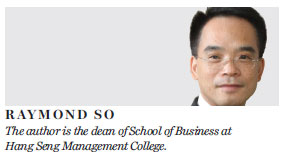Standardizing working hours is no easy task
Updated: 2015-03-26 07:30
By Raymond So(HK Edition)
|
|||||||||
According to "2014 Annual Earnings and Hours Survey" published by the Census and Statistics Department, the median working hours per week for all employees, are 45.9 and 43.4 for male and female employees, respectively. When compared to the figures released a year ago, median weekly working hours for males fell by 4.3 hours, while median weekly working hours for females decreased by 2.1 hours. From these figures it appears that Hong Kong employees should be happy with the findings, because a reduction in working hours, together with an increase in wages, suggests that in real terms wage have increased.
However, these are only median statistics. Upon careful scrutiny the report actually tells a very different story. Suppose someone works 64 hours a week, they are obviously part of the group of people who work very long hours. Indeed, this is equivalent to over 12 working hours per day for a five-day working week, or more than 10 hours a day for a six-day working week. Either way this is an example of someone who works long and hard. Again, the Census and Statistics Department report shows that over 164,000 people are categorized as working long hours. This category of workers accounts for more than 5.5 percent of Hong Kong's entire work force. The following sectors represent areas of concern: property management, security and cleaning services, elderly care, retailing, catering and transportation. For employees, long working hours must be balanced against occupational safety and health concerns. Long working hours clearly have an adverse affect on a person's work-life balance. It is unsurprising that members of Hong Kong's labor unions have demanded that standard working hours be enshrined in law. The labor sector hopes the government can legislate for standard working hours.
I am a member of the Standard Working Hours Committee with hands on experience of the continuous and often contentious debate on standard working hours. I genuinely understand the concerns of the labor sector. Throughout dozens of consultations, many express their desire for legislation to impose standard working hours in Hong Kong.
However, formulating standard working hours is not a simple matter. It is essential to consider the impact of such policies on society, particularly with respect to the effect upon small and medium enterprises.
Furthermore, there are many different kinds of jobs and it is not easy to accurately define "working hours" for many sectors. It is therefore not surprising that many organizations remain skeptical about defining standard working hours.
Aside from employers - and contrary to common belief - some professional groups also have opposing views on this issue. Hence, establishing standard working hours is not a simple matter. I became passionate about this subject when I read all the submissions and listened to the verbal submissions from various groups. But as I have said, it is highly complex issue.
Last week, chairman of the Standard Working Hours Committee talked of the committee's progress. The work of the committee has understandably aroused a strong response from the labor sector - again highlighting how sensitive the matter is.
The chairman mentioned some conclusions reached by the committee. This will help the committee move forward - but these are not final conclusions. The chairman's comments were actually acceptable directions. The next step is for the committee to complete their formal draft report for the government. But the real problem is: Why did the labor sector react so strongly in the first place?
It is incorrect to assume the committee ignored the labor sector's concerns. Labor sector representatives on the committee have fought hard for workers' rights. I believe the strong reaction was due to a general distrust of the government.
The labor sector wants the government to be decisive about standardizing working hours. When the sector sees such slow legislative progress, it is evidently disappointed. However, the concerns of management cannot be ignored as potential legislation also affects management. When the labor sector has high hopes for something, the government needs to consider things very carefully. The labor sector may conclude that the government is doing nothing. This is clearly a sign of growing mistrust.
When the committee submits its final report to the government, how will the government react? The labor sector will be watching closely.

(HK Edition 03/26/2015 page10)